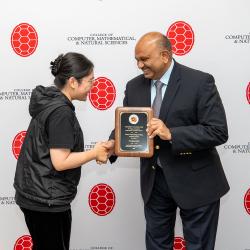Mathematician Denny Gulick Reflects on His 58-Year Career at UMD
The pi-reciting professor retired from teaching in August 2023 but still has campus ties.
Sidney “Denny” Gulick III is something of a celebrity at the University of Maryland. Alums of all ages and educational backgrounds remember taking one of Gulick’s math classes.
“Everywhere I go in Maryland, I meet people who enthusiastically recall a great teacher they had for calculus, and it almost always turns out to have been Denny, even if it was several decades ago,” said UMD Mathematics Professor and Associate Chair for Undergraduate Studies Larry Washington. “He's responsible for many people's fond memories of UMD.”
On August 1, 2023, Professor Gulick retired from teaching after 58 years at UMD, but he hasn’t gone far. He continues to handle class scheduling as the Department of Mathematics’ associate chair for course staffing, a role he’s had for nearly 20 years.
His time in the classroom may have ended, but Gulick said teaching is in his blood—and not even retirement can change that.
“My father, grandfather, great-grandfather and great-great-grandfather were all teachers. My wife was a teacher, and so was our son and our daughter,” he explained. “Teaching is a part of my system.”
3.14 (and many more)

Gulick is well-known across campus for his ability to recite 100 digits of pi from memory—a feat he demonstrates with the speed of an auctioneer during the annual Pi Day Celebration hosted by the College of Computer, Mathematical, and Natural Sciences. He has been honing this skill ever since a childhood accident claimed his left eye.
“When I was two years old, I tripped and fell on a spike that went through my eye, and at five I became nearsighted. My father didn’t think I should be reading very much because it might hurt my eye, so he gave me multiplication tables, and I learned them really well,” Gulick recalled. “Then he gave me pi to memorize to 15 places. I’ve loved mathematics ever since.”
Gulick’s interest in math flourished in adulthood. He earned a bachelor’s degree in mathematics from Oberlin College and a Ph.D. in the same subject from Yale University. He then did a two-year instructorship at the University of Pennsylvania before joining UMD in 1965, explaining that it was an exciting time to be a scientist.
“Sputnik went up in the late 1950s, and by the early 1960s there was a huge demand for mathematicians and physicists and engineers,” he said. “I was one of 10 math professors to come here in 1965, and the next year there were 18.”
Not long after joining UMD, Gulick met his future wife, Frances, then a postdoctoral fellow who became a longtime lecturer in the math department until her retirement in 2018.
“Every Tuesday evening, we had a seminar in functional analysis at a colleague’s home and Frances would cook for us,” Gulick fondly remembered. “That’s something I relish.”
Over the years, Gulick became a staple in the math department, gaining a reputation for his 8 a.m. calculus courses and charming catchphrases. “Don't fall into the abyss,” he’d often tell his students—a plea to carefully check their work to avoid crucial miscalculations.
“I have always claimed that there needs to be a little bit of humor in math classes. There needs to be a little bit of smiling,” Gulick said. “My whole goal was for them to learn as much as they could realistically learn without giving them psychological crises.”
‘A lasting impact’
Beyond teaching, Gulick helped mold mathematics curricula at UMD and across the state. He served as the undergraduate chair of UMD’s math department from 2003 to 2006 and was a longtime chair of the Statewide Mathematics Group, an organization of mathematicians from colleges and universities across Maryland. During his career, Gulick co-authored six editions of a calculus textbook and another on chaos theory and fractals—one of his favorite areas of mathematics.
Many of his roles extended beyond his department. Gulick judged high school science fairs and hovercraft competitions, co-chaired an East-Asian Science and Technology Group at UMD, and served on thesis committees (mostly in music, a personal passion of his).
For many years, he and his wife sent hundreds of “friendship dolls” to schools in Japan, continuing a family tradition started by his missionary grandfather, Sidney Gulick, in the 1920s. The dolls started as a token of kindness to foster cross-cultural understanding between the U.S. and Japan at a time of heightened tensions. Today, they continue to be a treasured gift.
Gulick and his wife now live in a retirement community in Silver Spring, Maryland. He hopes to take more trips to Yosemite National Park—his “favorite place on Earth”—and to their son’s family home in New Hampshire. Gulick, who plays cello, and his wife, a pianist, also plan to fill their free time with music, looking forward to many more duets together.
At UMD, Gulick’s teaching legacy lives on. Jim Yorke, a Distinguished University Professor Emeritus of Mathematics at UMD, said Gulick’s many contributions won’t soon be forgotten.
“He has always been proactive and vocal when he sees things that need fixing and he never shies away from a challenge, but more than that, Denny is a wonderful person to work with and to know,” Yorke said. “We are so grateful for his service and dedication to our department and to our students. He has made a lasting impact on the department.”







